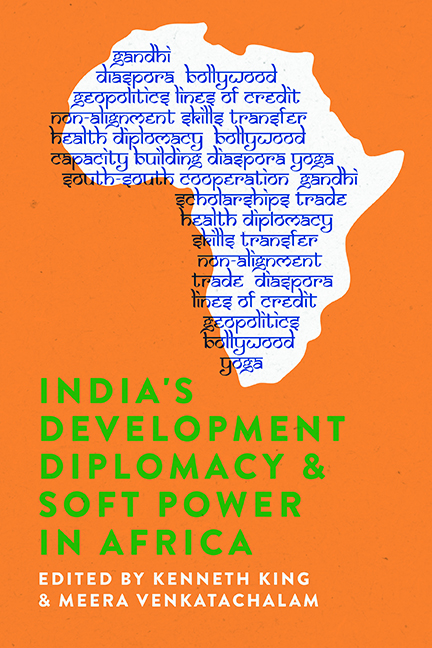Book contents
- Frontmatter
- Contents
- Notes on Contributors
- Acknowledgements
- List of Abbreviations
- Glossary
- Introduction: India–Africa Now: Changing Imaginaries and Knowledge Paradigms
- Part 1 The Geopolitical Imaginary and Soft Power
- Part 2 The Indian Political Right and the Reconfiguration of Soft Power in Africa
- Part 3 Capacity Building: Shifting Modalities and New Knowledgescapes
- Part 4 Skilling, Knowledge Transfer and Indo-African Interactions
- Conclusion: Reflections on India–Africa Studies, Development Cooperation and Soft Power
- Index
Introduction: India–Africa Now: Changing Imaginaries and Knowledge Paradigms
Published online by Cambridge University Press: 26 May 2022
- Frontmatter
- Contents
- Notes on Contributors
- Acknowledgements
- List of Abbreviations
- Glossary
- Introduction: India–Africa Now: Changing Imaginaries and Knowledge Paradigms
- Part 1 The Geopolitical Imaginary and Soft Power
- Part 2 The Indian Political Right and the Reconfiguration of Soft Power in Africa
- Part 3 Capacity Building: Shifting Modalities and New Knowledgescapes
- Part 4 Skilling, Knowledge Transfer and Indo-African Interactions
- Conclusion: Reflections on India–Africa Studies, Development Cooperation and Soft Power
- Index
Summary
India's foreign policy was crafted in the build-up to, and years after, independence in 1947. As India fashioned itself as a burgeoning democracy, mindful of its ethnic, linguistic and religious plurality, it also sought to develop a distinctive position on the global stage. India's first Prime Minister, Jawaharlal Nehru (in office 1947–64), was highly critical of the post-Second World War order, which was defined by the retreat of imperialism, emergence of the liberal capitalist system and the Cold War. The intellectual foundations of Nehru's normative agenda, which sought to govern India's international relations, drew from a variety of sources: British and international socialist ideas, Indian concepts derived from Buddhist ideas and Mahatma Gandhi’s philosophy of ‘passive resistance’ (Hall 2017: 116). India's foreign policy was based on respect for sovereignty and non-violence (Chacko 2013; Hall 2017: 116). Firstly, India vehemently supported decolonisation and independence in the Global South, and remained highly critical of Euro-American neo-imperialism and the economic and political marginalisation of formerly colonised peoples. India's opposition to apartheid and white minority regimes in Africa continued after Nehru's premiership. Secondly, Nehru helped to create a Non-Aligned Movement (NAM) to address Cold War politics, to bridge the divide between the Eastern and Western blocs and to press for universal nuclear disarmament. Ideas of peaceful co-existence on the international stage were enshrined in the ‘Panchsheel’ (translation: five pillars) agreement made with China in April 1954, and also addressed within the NAM, which brought together many African and Asian nations, most of them recently decolonised.
Indian Prime Ministers after Nehru understood their relations with Africa through the framework of southern solidarity, where multi-ethnic, from the unequal relationships between countries of the developed North and developing South. Nehru shared close personal friendships with leaders of newly independent African states, such as Kwame Nkrumah of Ghana, Jomo Kenyatta of Kenya and Julius Nyerere of Tanzania. Looked at more closely, though, Indian relations with Africa have consistently interlaced altruism with self-interest. Beginning with Nehru, Indian Prime Ministers have continued to see relations with Africa as crucial to leveraging Indian ambitions in multilateral arenas, most notably India's quest for a permanent seat at the United Nations Security Council (UNSC).
- Type
- Chapter
- Information
- Publisher: Boydell & BrewerPrint publication year: 2021
- 1
- Cited by

